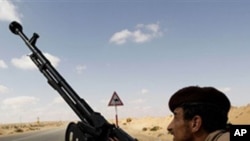An official of the U.S.-based Human Rights Watch (HRW) says her organization is increasingly concerned about the “enforced disappearances” of anti-government protesters in the Libyan capital, Tripoli, who, she says, are now refusing to aid efforts aimed at documenting ongoing human rights abuses.
Heba Fatma Morayef, researcher for the rights organization for Libya, says ordinary Libyans do not want to take any more risks after forces loyal to embattled leader Moammar Gadhafi launched increasing attacks on anti-government protesters, who demand Gadhafi step down and cede power.
“What is of serious concern for us is the increasing reports of enforced disappearances over the last period of time. This has, in some cases, been apparently targeting people who have been vocal, who have spoken to the media or who have been sending information out of the country about the situation,” said Morayef.
“But… the current status of the people who have disappeared is obviously unknown and [it] is a very serious concern given the pattern of disappearances by the Libyan government in the past,” she added.
Libyan government forces attacked rebel-held towns in eastern and western areas Tuesday with airstrikes, rockets and artillery, in a continuing offensive against opposition fighters trying to topple the Gadhafi regime.
Warplanes carried out several airstrikes on rebel positions around the eastern oil port of Ras Lanuf. Pro-Gadhafi forces also attacked rebel positions several kilometers to the west, where opposition fighters have set up a checkpoint that represents the farthest they have advanced from their stronghold of eastern Libya.
Morayef says the ongoing attacks have scared ordinary citizens living in the Libyan capital.
“Tripoli is calm now because people are no longer taking the risk of attempting to reassemble in places because they were met with live gunfire over the past two weeks. The situation is very difficult in terms of trying to document types of violations that may be occurring like, for example, some of the cities that have seen the most violence over the last couple of days, like in Misurata are not even cities that even journalists can access it at this point,” said Morayef.
“It’s also been difficult to get proper statistics on the deaths out of Tripoli because hospitals are under such a great deal of security pressure and individual doctors are under pressure not to reveal the numbers. And many of those who have spoken up previously refuse to speak to the media or to the international organizations,” she added.
Gadhafi's forces also continued an onslaught on the western town of Zawiya, the closest rebel-held community to Tripoli. Government officials said Gadhafi loyalists, who have besieged Zawiya for days, were largely in control Tuesday, but some residents said rebels still held the town center.




